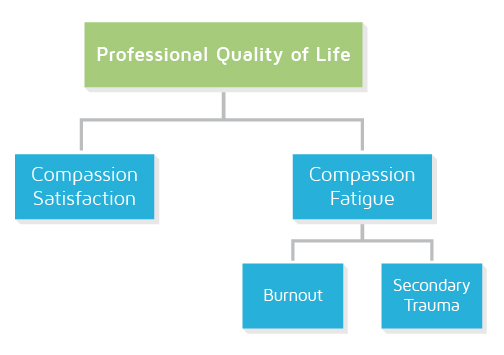Compassion Fatigue
Most of us decided to go to law school because we had a passion for justice and helping people. While we may not think of the legal profession as a traditional helping profession like we typically think of social work, the reality is that we serve in a primary helping capacity. Clients are in distress; enough so that they have elected to pay someone (a lawyer) to help them fix the problem or help them achieve the best (or more often, the least bad) outcome.
When we help a client fix a problem or reach a desired outcome, we often feel a strong sense of personal and professional achievement and satisfaction. Researchers call that “compassion satisfaction.” Compassion satisfaction is crucially important because it sustains us through the bad days – the days when we don’t achieve the desired outcome or when a client has no viable good options. For many of us, much of our career is spent assisting people in terribly difficult situations, and our ability to effect real change or outcomes is far more limited than we ever imagined it would be.
With the ever increasing specialization of the profession, today most lawyers deal with a very high volume of the same kind of client distress day in and day out. It is not uncommon, for example, for a workers’ comp lawyer to have anywhere from 250-400 open cases at one time. With a high case load and non-stop exposure to the same type of client distress, over the course of a career, the bad days can begin to outweigh the good ones. When that happens, we may develop a condition known as compassion fatigue. If left unaddressed, compassion fatigue can lead to secondary trauma and burn out.

Compassion Fatigue
By Beth Hudnall Stamm PhD, et. al.
Compassion fatigue is defined as the cumulative physical/emotional/psychological effects of continual exposure to traumatic or distressing stories/events when working in a helping capacity where demands outweigh resources. The two largest factors that contribute to developing compassion fatigue are 1) high volume of workload and 2) exposure to client distress and trauma. Unfortunately, all the best legal training in the world cannot turn off our mirror neurons, that highly-evolved part of our brain which responds neurologically-emotionally to other people’s distress as an involuntary response (even when we might not have any conscious awareness of an emotional response). The symptoms of compassion fatigue can often mimic those of depression or anxiety, but there are a few key differences (and depression and anxiety are often symptoms of compassion fatigue).
Behavioral symptoms
- Absenteeism from work
- Anger and irritability with co-workers, clients, opposing counsel, judges, family and friends
- Indecisiveness; an impaired ability to make decisions
- Avoidance of clients in general or certain clients
- Lack of diligence in work performed
- No longer finds enjoyment in hobbies and activities that used to be pleasurable
- Avoidant behavior at home (e.g. watching too much TV, reading, on-line gaming, and not interacting with family or friends)
Psychological symptoms
- Emotional exhaustion
- Intrusive thoughts (like flashbacks to evidence in an old case when one is at home… or a sense of dread of something bad happening to one’s family or children)
- Heighted sense of anxiety and fear
- Sleep disturbance at night and fatigue during the day
- Loss of Appetite
- Cynicism (loss of empathy; loss of faith in humanity)
- Sense of isolation or alienation from others (for example, either intentionally distancing from friends and family or simply feeling isolated in a group, “When I get home, I feel like I am from another planet with what I saw today at work.”)
- Physical complaints (headaches, stomach problems, TMJ, back problems, etc)
- Feeling helpless
- Dread of seeing certain clients
When one moves beyond compassion fatigue into secondary trauma and burnout, symptoms are more severe. In secondary trauma, the lawyer or judge has developed a PTSD (post-traumatic stress disorder) response to the day-to-day activities needed in his or her job and in life. The PTSD response results, not from some personal trauma the lawyer once suffered, but from the vicarious trauma he or she is exposed to when helping clients.
Judges, in particular, are at risk for developing compassion fatigue, especially district court judges. And lawyers in these practice areas are considered particularly at risk for developing compassion fatigue:
- Criminal law
- Family law
- Personal injury and workers comp law
- Medical malpractice law
- Personal bankruptcy
- Wills, trusts and estates
In good news, compassion fatigue can often be treated largely through awareness and lifestyle choices. If you have questions about compassion fatigue or think you might be suffering from it, please give us a call or email us today.
